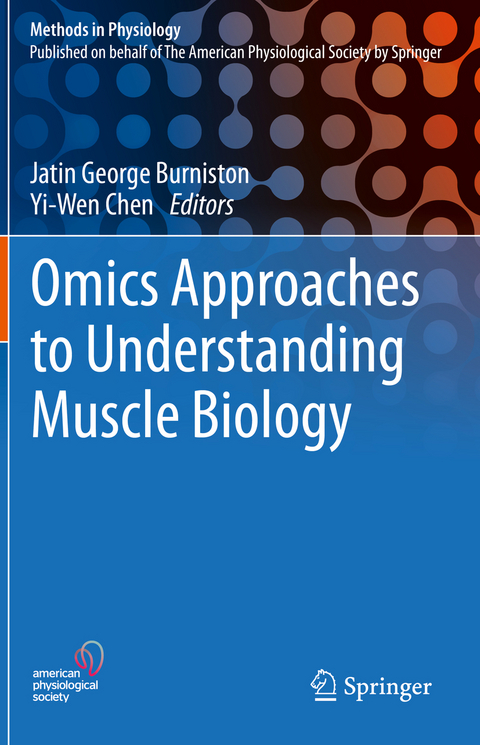
Omics Approaches to Understanding Muscle Biology
Springer-Verlag New York Inc.
978-1-4939-9804-3 (ISBN)
Presenting the latest researchtechniques, this book is a valuable resource for the physiology community, particularly researchers and grad students who want to explore the new opportunities for omics technologies in basic physiology research.
Jatin Burniston is a Professor of Muscle Proteomics at the Research Institute for Sport & Exercise Sciences, Liverpool John Moores University, UK. He established the first proteomics facility with a specific focus on exercise physiology and published the first works reporting proteomic analysis of striated muscle responses to exercise training. Jatin strives to continue pioneering the field of exercise proteomics and is a proud champion of the application of non-targeted '-omic' research in exercise physiology. He recently combined his expertise in mass spectrometry and proteomics with new metabolic labelling methods using deuterated/ ‘heavy’ water to establish the unique ‘Dynamic Proteome Profiling’ method. Jatin serves on the Editorial Board of the American Physiological Society (APS) journal, Physiological Genomics, and is a Fellow of the European College of Sports Sciences (ECSS) and a member of the ECSS Scientific Committee. He also leads the MSc Exercise Physiology programmeat Liverpool John Moores and particularly enjoys delivering his module on Molecular Exercise Physiology. Yi-Wen Chen is an Associate Professor of Genomics and Precision Medicine at the George Washington University and Principal Investigator at the Center for Genetic Medicine Research, Children’s National Health System, DC, USA. Her research uses transcriptomic approaches to study molecular pathways in muscles in response to physiological stimuli and pathological conditions. Yi-Wen uses genome-wide RNA profiling to dissect the disease mechanisms of various muscle disorders and to identify molecular mechanisms of adaptive remodelling. In addition, her group uses next-generation sequencing and long-read sequencing to study genetic, epigenetic and transcriptomic changes in muscles using physiological and disease models. Currently she is part of the Human Cell Atlas consortium, with a focus on single-cell profiles and spatial characterization of gene expression in skeletal muscles at different developmental stages.
Part I: Genomic and Epi-genomic.- 1) GWAS/muscle function and diseases (by Eric Hoffman).- 2) Whole genome and whole exon sequencing/muscle disorders (by Silvère van der Maarel and Richard Lemmers).- 3) Epi-genome approaches/muscle regeneration (by Vittorio Sartorelli).- Part II: Transcriptomic.- 4) RNA profiling (by Yi-Wen Chen, confirmed).- 5) miRNA profiling (by Alyson Fiorillo).- 6) Single cell profiling in muscle (byPier Lorenzo Puri).- 7) Statistics and bioinformatics (by Heather Gordish).- Part III: Proteomic.- 8). Proteome profiling of human/ clinical samples – i.e. necessarily label-free techniques (by Lawrence Mandarino).- 9) Proteome profiling of cell and animal models – i.e. label techniques such as SILAC (by Matthias Mann OR SILAM with JR Yates III).- 10) Global analysis of post-translational modifications (by David E James).- 11) Proteome dynamics – synthesis and degradation on a proteome wide scale (by Jatin Burniston, confirmed).- Part IV: Metabolomic.- 12) Non-targeted metabolomics using mass spectrometry (by Charles Burant).
| Erscheinungsdatum | 13.11.2020 |
|---|---|
| Reihe/Serie | Methods in Physiology |
| Zusatzinfo | 32 Illustrations, color; 3 Illustrations, black and white; VII, 217 p. 35 illus., 32 illus. in color. |
| Verlagsort | New York |
| Sprache | englisch |
| Maße | 155 x 235 mm |
| Themenwelt | Studium ► 1. Studienabschnitt (Vorklinik) ► Physiologie |
| Naturwissenschaften ► Biologie ► Biochemie | |
| Naturwissenschaften ► Biologie ► Zellbiologie | |
| Schlagworte | high-throughput analytical techniques • muscle atrophy and dysfunction • Muscular dystrophy • omics technologies • RNA profiling • Skeletal muscle • Skeletal muscle development • Skeletal muscle physiology |
| ISBN-10 | 1-4939-9804-8 / 1493998048 |
| ISBN-13 | 978-1-4939-9804-3 / 9781493998043 |
| Zustand | Neuware |
| Informationen gemäß Produktsicherheitsverordnung (GPSR) | |
| Haben Sie eine Frage zum Produkt? |
aus dem Bereich


